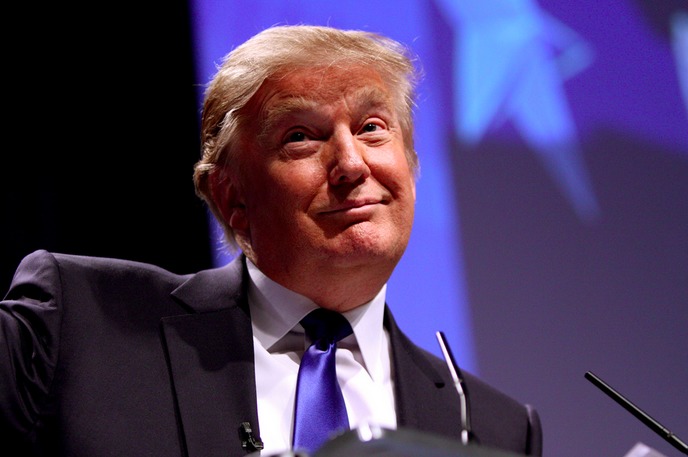Election day 2016 marked the coming of a new President. It also marked – much more quietly – the end of the third quarter earnings season. Both events revealed some winners and losers.
Election winners? At least for the first few weeks, Mr. Market was a winner. Most stock indices defied negative expectations embedded in a Trump victory and rose. I’ll let the TV pundits divine why what was supposed to be a risk-off event suddenly turned into market melt-up.
Investors exposed to small cap stocks were surely happy, as the Russell 2000 Growth index rose more than 10% in the subsequent two weeks.

Tech Titans
Could it be that the $2.5 trillion in offshore cash held by big American companies like Apple (AAPL) and Alphabet (GOOGL) could find its way home and be spent on smaller acquisitions? Now that would be bigly.
Election losers? How about large technology companies that might see a cut-back in H-1B visas that make it easier to attract worldwide talent. Tech companies would also be vulnerable to less-free trade or an outright trade war that cripples cross-border supply chains.
And spare a thought for Amazon (AMZN) leader Jeff Bezos, owner of Trump target The Washington Post. Will more Amazon customers need to start paying state sales taxes, cutting into the e-commerce giant’s competitive advantage? We’ll just have to let Jeff and The Donald hug it out.
Meanwhile earnings season revealed winners and losers in our benchmark portfolio.
Expeditors International (EXPD) is a shipping logistics provider headquartered in Seattle. They make their money organizing, consolidating and forwarding goods via air, rail and road. Its September quarter, however, left a lot to be desired.
And CEO Jeff Musser was left to provide the ‘money quote’ in Expeditors’ November 8 earnings release: “We grew our business even as rates were rapidly adjusting to a very fluid marketplace and pressuring margins beyond what we would normally expect.”
Trade Friction
EXPD executed admirably during these tough times, generating substantial cash flow and claiming to be gaining market share. But wait – while global growth has slowed and trade friction has risen in the past year, these really aren’t tough times.
Shipping costs (mostly energy prices) remain low and there’s not much of a geopolitical risk “tax” on trade with the world a largely peaceful place.
Yet Expeditors is shrinking – revenue was down 5% y/y – while the rest of the world is growing. If you can’t thrive when times are good, what’s it going to be like when times aren’t?
Or when, just hypothetically, a new U.S. president takes office determined to repeal or renegotiate major trade agreements on ‘day one?’ I expect we’ll be shipping our shares of EXPD the next time we rebalance the portfolio. Sad.
More happy was the news from government information technology contractor Leidos (LDOS).
On November 3, the Reston, Virginia-based company offered a clinic in public company performance. September quarterly earnings were $1.25/share, versus Street expectations of $0.96/share.
Defense Plays
Operating profit margins were 9.5% versus 7.2% in the year-earlier quarter. The company’s own full year earnings expectations were raised substantially on the back of an eye-popping book-to-bill ratio of 1.56.
Some of the brighter outlook for Leidos is due to the recent acquisition of the Information Systems and Global Solutions division of rival Lockheed Martin (LMT).
But Leidos’ existing businesses, themselves spun out of Science Applications International Corp. (SAIC) just three years ago grew organically as well in the quarter. Now, the newly larger Leidos, which the Street expects to report $4.6 billion in 2016 revenue, is firing on all cylinders.
Just in time for an all-Republican President and Congress swept into office on pro-military rhetoric and plans for massive infrastructure spending spearheaded by private industry. Did I mention Leidos just reported a book-to-bill ratio of 1.56? That’s yuuge!
Happier still were the earnings and outlook from II-VI Inc. (IIVI) on October 25. Pittsburgh-based II-VI makes lasers, optoelectronic components and engineered materials.
It markets its products not only to traditional industrial customers, but also to telecommunications carriers and private enterprises for carrying ever more data through fiber optic cables.
II-VI is a lesser-known player in optoelectronics compared with Oclaro (OCLR), Finisar (FNSR) and Neophotonics (NPTN) but has benefitted no less from the explosive demand for data transmission.
And II-VI’s September quarter performance was explosive: revenue up 17% year-over-year, bookings up 31% and non-GAAP operating margins increased to 14.1% from 12.5% y/y.
What about the future? II-VI reported a book-to-bill ratio of 1.1 at the end of September, which is really good. You might even say it’s tremendous.
Disclosure: The securities identified and described do not represent all of the securities purchased, sold or recommended for the benchmark portfolio. The reader should not assume that any investment in the securities identified was or will be profitable.
Photo Credit: Gage Skidmore via Flickr Creative Commons



